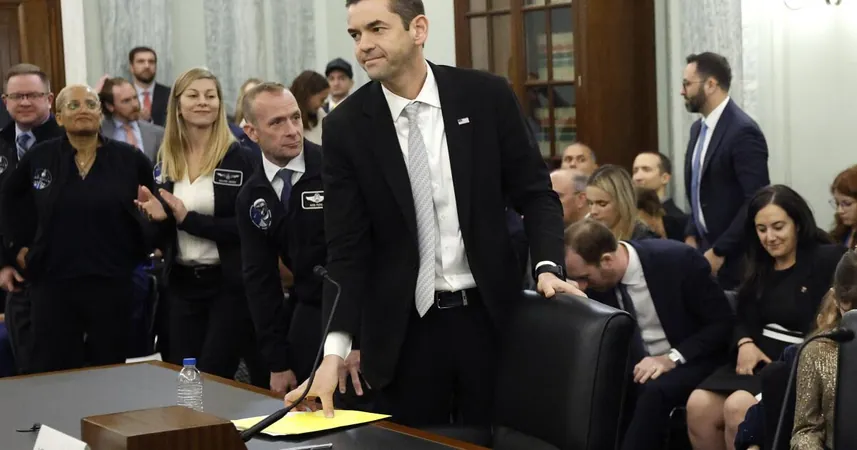
Trump's NASA Cuts: A Decade-Long Impact on Science and Space Exploration
2025-06-09
Author: Ming
NASA Faces Unprecedented Budget Cuts
NASA, renowned for its scientific achievements and public scrutiny, now faces a daunting challenge: the Trump administration's proposed budget cuts, threatening to slash funding for its science programs by nearly 50% and overall spending by about 24%.
Leadership Void at NASA
The budget was reportedly crafted with little consultation from NASA, exacerbated by the agency lacking a formal leader after the abrupt withdrawal of Jared Isaacman's nomination for NASA administrator. Isaacman, a billionaire space enthusiast, was seen as a potential advocate for NASA’s interests.
The Fallout of the Musk-Trump Split
NASA's future looks even bleaker following a fallout between Trump and Elon Musk, whose company SpaceX serves as a major contractor. Experts warn that these cuts would reduce NASA’s budget to levels not seen since the early days of the Project Mercury program in the 1960s.
What’s on the Chopping Block?
Dreier, chief of space policy at the Planetary Society, highlights that key scientific projects, including those pivotal for understanding climate change, are on the line. While some programs that provide immediate, practical applications remain funded, far-reaching studies in astrophysics and Earth sciences face crippling cuts.
The Illogic of the Cuts
The proposed cuts undermine the administration’s stated focus on returning astronauts to the moon and sending crews to Mars. These lofty ambitions, such as the Artemis program slated for late 2027, depend heavily on scientific research, much of which is being eradicated.
A Question of American Leadership in Space
Trump's rhetoric emphasizes American dominance in space, dismissing the contributions of international talent that have propelled the U.S. space program. Historical figures, including Wernher von Braun, played critical roles, yet are often dismissed in the current administration's narrative.
The Global Nature of Space Exploration
Space missions like those to the moon or Mars require global cooperation and cannot be solely accomplished by the U.S., especially under a politically fragmented system. The lack of organized consensus makes sustaining long-term projects increasingly difficult.
The Economic Pitfalls of Cutting Science
In financial terms, discontinuing these projects wastes billions already spent by taxpayers and neglects to cultivate future generations of scientists. The initial investment in spacecraft design and engineering dwarfs the operational costs once missions commence.
The Shadow of Project 2025
Evidence suggests the harsh budget cuts were influenced by Russell Vought, director of the White House Office of Management and Budget, who has openly criticized NASA's climate programs. The budget mirrors a blueprint he proposed for the Trump administration, calling for drastic reductions in NASA’s scientific endeavors.
A Bleak Future for NASA
The rejection of Isaacman's nomination underscores the agency's precarious situation. Experts fear that without strong leadership, NASA's capacity to advocate for itself is severely diminished, placing its very survival at risk.
The Cosmic Consequences of Funding Cuts
If these cuts go through, NASA could face an existential crisis that may leave a void filled by other nations, such as China. Dreier notes, "You turn off the lights and they just tumble into the blackness of space." These satellites, our eyes into the cosmos, may metaphorically close our eyes to the wonders beyond.




 Brasil (PT)
Brasil (PT)
 Canada (EN)
Canada (EN)
 Chile (ES)
Chile (ES)
 Česko (CS)
Česko (CS)
 대한민국 (KO)
대한민국 (KO)
 España (ES)
España (ES)
 France (FR)
France (FR)
 Hong Kong (EN)
Hong Kong (EN)
 Italia (IT)
Italia (IT)
 日本 (JA)
日本 (JA)
 Magyarország (HU)
Magyarország (HU)
 Norge (NO)
Norge (NO)
 Polska (PL)
Polska (PL)
 Schweiz (DE)
Schweiz (DE)
 Singapore (EN)
Singapore (EN)
 Sverige (SV)
Sverige (SV)
 Suomi (FI)
Suomi (FI)
 Türkiye (TR)
Türkiye (TR)
 الإمارات العربية المتحدة (AR)
الإمارات العربية المتحدة (AR)